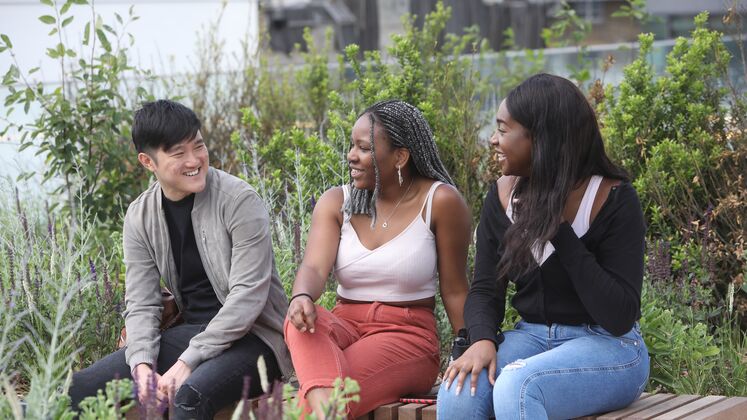There’s no denying that university is a minefield! With so many events going on at once – and having to balance this with your studies – it can be hard to commit to extra things on top of studies and going out. Still, joining a society is well worth your time: not only is it a great way to make friends who have similar interests to you, but it can also offer brilliant opportunities to cultivate leadership, organisation, and teamwork skills (all of which are super useful to bring up in a job interview!).
With options as varied as Bhangra, Poker, and Film, it can feel overwhelming to make decisions about what to attend. Considering this, you might wonder, ‘How do I narrow down all the societies?!’ – a very fair question, considering how many societies are on offer at LSE. Here are my top tips for choosing between societies at university:
1. Attend ‘Give It A Go’ sessions (or stalk on social media)
Give It A Go sessions are most common at the start of term, where societies organise events to give you a feel for what kinds of events will be on offer if you join their society (which usually involves paying a membership fee). Often, societies may run GIAG sessions for a few weeks, as committee members know that you may be trying out a few different societies, to see what most appeals to you!

But, even if you aren’t able to attend a GIAG session, there are plenty of other ways to find out what happens during this society’s events: for instance, before starting at uni, I had a look at the Instagram/Facebook pages of the societies I was interested in, which often feature past events that the society has held. Additionally, societies often hold events that are paid for separately and open to non-members – for instance, the LGBTQ+ Society recently held a mug-painting class.
2. Rule of 3 (don’t overdo it!)

There will certainly be societies you are more immediately drawn to than others. This is not to say that you should just focus on those (you never know – maybe pushing yourself out of your comfort zone could open up a whole new hobby for you!). However, it is likely that you can discard quite a few societies based on instinct: ‘Do I really want to sacrifice my time to this every week over other things?’. For example, while I am a huge tea-lover, I realised that attending Tea Society wasn’t necessarily the best idea for me, because I had other priorities that I wanted to spend more time on. I would still recommend following the societies you’re mildly interested in on Instagram though, in case they do a one-off event or a collab with another society that interests you!
Realistically, though, even the most dedicated of us can only attend 3-4 societies (I say this as someone who regularly over-commits to things). My advice is:
- Choose one sporting activity to keep healthy and let off steam during term time – even if you’re not hugely into sports, options like Yoga mean you can stretch muscles after spending days hunched over your laptop studying! Additionally, a lot of social events (like Wednesday Sports Night) are held by sports societies, so it’s worth joining for that.
- Choose one hobby/interest to relax and meet people with similar interests (for instance Album Soc)
- Choose one academic/career-related society – although I shudder at falling into the LSE stereotype by using the word ‘networking’, career-related societies are genuinely a great place for finding out more about potential future jobs, hearing about internships, and meeting people with similar aspirations.
- Choose one cultural/religious society – sometimes, it can be overwhelming to be far away from home and it can be nice to talk in your first language or do cultural activities with people who have a shared background. Having a cultural society to attend can be very comforting, especially if you feel home-sick!
3. Compare prices!
London uni life can be expensive – and joining many societies which you’ll only end up forgetting about in a few weeks’ time might not be the most sensible thing for your budget. However, not to worry! There are plenty of societies that are well worth paying for – and even some free societies which you can try out:

- If you’re interested in poetry, art, and other similar creative endeavours, you could consider joining the Clare Market Review. If you’re interested in more serious journalism (or satire, reviews, sports, etc.), the Beaver (LSE’s student newspaper) is always looking for contributors! If, on the other hand, you’re more into music, PuLSE Radio is also free to join.
- In terms of pricing, it’s usually the sports societies that are most expensive. Paying £50 upfront for something you’re not 100% certain on can definitely be a big commitment. However, I’d recommend taking a look at whether there is an extra fee for each session:
- Some societies are deceptively cheaper upfront but require £5 per session, which can really add up. In contrast, while societies like Tae Kwon Do may seem more expensive, when you divide the price (£50) between the number of sessions offered (3 x week), you realise you’re only really paying £1.50 per two-hour class, which – for a sport – is extremely subsidised.
It’s also worth considering how far away the location for the sport is – a friend of mine who does rowing has to travel over an hour to practice, which means it takes up quite a bit of time (and money – TFL prices are no joke!). Societies like Dance hold their practices on campus, which means they’re far more convenient to attend (and, as such, make more sense to pay for).
4. Look for stars!
One handy way to check the frequency and quality of societies, particularly those which aren’t new, is whether they have been awarded an SU star (can be seen on the societies website). Societies with a gold or silver star often have more events, including collaborations, socials etc., and may invest more time into running these events.

It’s also worth checking (using Instagram/Facebook) how often the events are and how much they vary in content. (e.g. do they offer socials as well as talks? Or is it the same event every week?). Consider whether you prefer more infrequent meetings or a more serious weekly commitment (for instance, you might consider applying for a committee role!).
With that in mind, I wish you luck in finding a society you’re excited to be part of!





